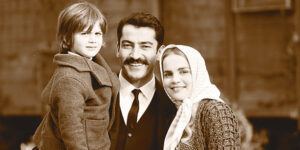Veteran filmmaker and producer Osman Sınav presents an adaptation of Mustafa Kutlu’s novel of the same name in “Uzun Hikaye” (Long Story), his newest directorial effort that opened in Turkish theaters on Friday.
 The film follows the story of one man and his family starting from the 1960s until the ‘70s.
The film follows the story of one man and his family starting from the 1960s until the ‘70s.Turkish heartthrob Kenan İmirzalıoğlu plays the lead of this abundantly melodramatic but beautifully shot film that strives to allude to the political atmosphere of the era through a personal story of grief and redemption.
Ali (İmirzalıoğlu) is a young and boisterous man who just keeps on smiling and takes whatever life throws at him. At heart he is a drifter, but his life principles are manifest in his rebellious attitude towards injustice and fairness. This attitude, we learn, gets him into constant trouble with the state authorities, as such he drags along his family from one Anatolian town to the next once one authority figure or the other deems his aspirations of equality as “communism.”
Remember this is the Cold War era. His wife is the gorgeous Münire (former model Tuğçe Kazaz, who has immense screen radiance but not a drop of acting talent as yet) who is utterly in love with her hubby. Their young son, Mustafa, who also narrates the story, is in awe of his parents’ zest for life, and especially admires his father’s honesty and optimism. In fact, this admiration is so abundantly declared throughout his voiceover I was about to go into a saccharine shock midway of the film. Surely, it’s cute as hell, but no one should love their parents so much. Sorry.
But really, how long can this happy picture continue in a life struck with poverty and escapism?
Also, it’s important to mention that the destitution of the family is understood more by dialogue than art direction, since the costumes and general atmosphere are struck with the kind of retro nostalgia that we appropriate to those “good old times” when life was ever so simple.
When a fatal accident takes away the lovely Münire from the life of Ali and Mustafa, the father and son decide to continue their limbo existence. But of course the young Mustafa finally begins to see what kind of a person his father might really be: An honest and loving man who indeed stands by his principles and raises his voice against his repressors but never really takes the full step of protest. Ali’s perception of life is more in line with humanism and survivalism than that of political activism. And perhaps this is why Mustafa begins to have a hard time forgiving his father.
Years pass and Mustafa grows into his early 20s (actor Ushan Çakır takes over the role). The two men open up a bookshop in the latest town they anchor at. The political climate is even worse than it was before, but now it isn’t just Ali who has a problem with the authoritarian regime, but also Mustafa slowly transforms into a man of rebellion.
Now the real problem in the story is that although we realize that the father and son have leftist leniencies, we never really see them owning up to the political group that they so obviously belong to. This filmic choice gives way to a huge white elephant in the room. I really don’t see how, in such a specifically politically ridden era, individuals chose only to adopt vague concepts of righteousness that only originate from spirituality and philosophy. Surely, nothing should be simplified or reduced to politics, but when Ali incessantly deals with men of the state who themselves are extremely political (a tad too much in fact, to the point that they are two-dimensional characters) we do expect to see a kind of clash that is not just about corruption, but also about ideologies. The authority figures throughout the film (be they district attorneys, teachers, mayors) are portrayed to be too evil and obstinate to be convincing. Their degeneracy becomes the real issue of the film, whereas one would have hoped to see encounters that are more complex and that pertain to something more than the abuse of power.
The end of the story, finally, is brave enough to allow Ali to take the necessary stance in life and is optimistic enough to see a future for the likes of Mustafa. The melodramatic flair will definitely hook Turkish audiences and indeed there are some strong moments of emotional ingenuity and profundity.
Nevertheless, even though “Long Story” has the potential to be something a lot more than a lustrously crafted melodrama with a seductive kind of nostalgia, it chooses to row its boat in a pond while it could have roamed in a stormy sea. It might have been rough and tough, but it would have been so much more of an intense journey.
‘Uzun Hikaye’ (Long Story)
Directed by: Osman Sınav
Country: Turkey
Genre: drama
Cast: Kenan İmirzalıoğlu, Tuğçe Kazaz İsmail Hakkı Ürün, Kürşat Alnıaçık, Erkan Avcı, Mustafa Alabora, Zafer Algöz
(Today’s Zaman)















